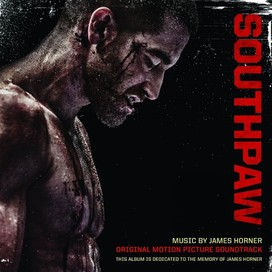
Southpaw casts Jake Gyllenhaal as a boxer at the height of his prowess, whose wife (Rachel McAdams) pleads with him to retire and be a better father to their young daughter. When his wife is tragically killed, however, he turns even more to boxing and climbs even higher with the help of his trainer (Forest Whitaker). The film was partially inspired by Eminem's personal struggle and the rapper was initially signed on to play the focal welterweight until Gyllenhaal replaced him in March of 2014. Similarly, composer James Horner replaced Fuqua collaborator Harry Gregson-Williams (The Equalizer), in an interesting switch-up given the film's content. Whereas Southpaw seemed tailor-made to fit Gregson-Williams' subdued and brooding dramatic style, this was uncharted territory for Horner: he described the film as existing in a world "[he] knew nothing about" and "challenging."
Indeed, Southpaw is a departure for Horner in terms of both content and sound. A self-purported fan of Trent Reznor and Atticus Ross's The Social Network, Horner seems keen on experimenting with that score's tonal and electronic soundscape here. The opening "The Preparations" begins the score with a brooding electronic atmosphere and single-note pulses reminiscent of Zimmer's so-called "horn of doom." A recurring piano motif punctuates these pulses, based around a simple chord progression similar to Roy Budd's recognizable main theme from Get Carter (see "Goodbye Carter!"). With paced electronics and tapping percussion, the track is an uncommonly "modern" and minimalist effort from Horner. "A More Normal Life" injects a bit of tempered warmth into the score, with twinkling electronics and piano creating a fragile, impressionistic soundscape. A deep bass pulse and distant brass, however, suggest some impending tragedy. "A Fatal Tragedy" reprises the main motif with more gravitas while Horner creates a thick soundscape of electronics, electric guitar, and low-mixed choir in the mournful "The Funeral, Alone...". Curiously, it doesn't sound too far off from what Harry Gregson-Williams might have conjured up for the film.
There's palpable tension in "Suicidal Rampage," a track defined by an aggressive electronic soundscape and a muted reprise of the main theme. "Empty Showers" continues the soundscape of "A More Normal Life" with the addition of Santaolalla-esque acoustic guitar, before the emotional strings of "Dream Crusher" return us to more familiar Horner territory. Contemplative piano and taut percussion are blended in "A Cry for Help", and the dejected "House Auction" rips a motif straight from Horner's own The Amazing Spider-Man. In such instances, it's safe to say that Southpaw gains more points for its intriguing soundscapes than its motivic creativity. "A Long Road Back" is undoubtedly the most traditional James Horner piece to be found in the score, as warm strings and rhythmic piano explore in greater depth the composer's The Amazing Spider-Man motif... not the most creative, but certainly the most satisfying track. Horner emulates the thick electronic atmospheres of Trent Reznor and Atticus Ross in "Training" and then reprises The Amazing Spider-Man again in "How Much They Miss Her," this time quite transparently. I guess it's fitting that this most unoriginal of Horner tracks is followed by the surprising "Hope vs Escobar", an aggressive, eight-and-a-half-minute action cue that sounds nothing like Horner until its final minute. Harsh electronics give the cue a dark edge, carrying it to a heavily percussive mid-section and a stirring, Zimmer-esque finale complete with chopping ostinatos and sustained brass notes. Horner then concludes the score with a final reprise of the Southpaw motif in the aptly-titled "A Quiet Moment..."
James Horner's Southpaw is an admirable foray into new territories for the composer, but occasionally it draws too heavily on familiar chord progressions and rhythms. It's a fine effort overall and doesn't feel its runtime (which is impressive considering the score's minimal thematic footprint), but listeners would do well to temper their expectations. Because it is the composer's final score, the odds are indomitably stacked against it. Many listeners will hope to hear something definitively Horner, a grand, orchestral finale from which they can draw some sort of closure. This is an unfair expectation to have of any score, particularly when the score is so intentionally minimalistic. Such closure can be found elsewhere, perhaps in the recent double concerto Pas de Deux or in any one of Horner's much-loved classics. To best appreciate Southpaw, the score must be evaluated on its own merits and, on those, it is an intriguing and mostly recommendable addition to the composer's filmography.
|
A Few Recommended Tracks: "The Preparations," "A More Normal Life," "House Auction," "A Long Road Back," "Hope vs Escobar" Label: Sony Classical Availability: 14-track edition |
|

 RSS Feed
RSS Feed
